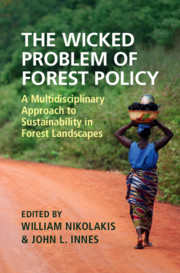 The Wicked Problem of Forest Policy
The Wicked Problem of Forest Policy Book contents
- The Wicked Problem of Forest Policy
- The Wicked Problem of Forest Policy
- Copyright page
- Contents
- Contributors
- 1 The Wicked Problem of Forest Policy
- Part I Wicked Problems and Policies
- Part II Tools to Address Wicked Problems
- 9 The Wicked Problems of Indonesia’s Forests Require Effective Institutions to Resolve Difficult Trade-Offs
- 10 Power to the Forest People
- 11 How Are Land-Use Multi-stakeholder Fora Affected by Their Contexts?
- 12 Sustainable Landscape Investment
- 13 Community Forestry in Liberia
- 14 Are Some Forestry Problems Too Wicked?
- Index
- References
14 - Are Some Forestry Problems Too Wicked?
from Part II - Tools to Address Wicked Problems
Published online by Cambridge University Press: 24 July 2020
- The Wicked Problem of Forest Policy
- The Wicked Problem of Forest Policy
- Copyright page
- Contents
- Contributors
- 1 The Wicked Problem of Forest Policy
- Part I Wicked Problems and Policies
- Part II Tools to Address Wicked Problems
- 9 The Wicked Problems of Indonesia’s Forests Require Effective Institutions to Resolve Difficult Trade-Offs
- 10 Power to the Forest People
- 11 How Are Land-Use Multi-stakeholder Fora Affected by Their Contexts?
- 12 Sustainable Landscape Investment
- 13 Community Forestry in Liberia
- 14 Are Some Forestry Problems Too Wicked?
- Index
- References
Summary
There have been numerous discussions about the future of the world’s forests since the United Nations Conference on Environment and Development in 1992. These discussions continue today at fora such as the United Nations Forum on Forests, where forest policy-makers from around the world come together to talk to each other about forests. These discussions are coming full circle, with many of the topics from earlier discussions being revisited by a new generation of participants. Meanwhile, tropical forests continue to be converted to other forms of land use, while some forests, like those of Canada have switched from a carbon sink to a carbon source, and many forests continue to be degraded by poor management or even the complete absence of any formal management. These represent major challenges and require appropriate responses, but such responses have on the whole not materialized.
- Type
- Chapter
- Information
- The Wicked Problem of Forest PolicyA Multidisciplinary Approach to Sustainability in Forest Landscapes, pp. 376 - 383Publisher: Cambridge University PressPrint publication year: 2020


